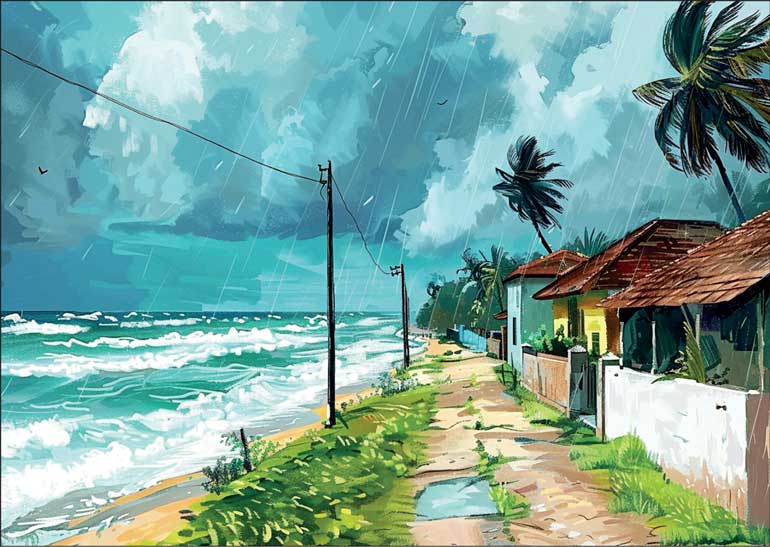Sunday Feb 15, 2026
Sunday Feb 15, 2026
Saturday, 10 August 2024 00:15 - - {{hitsCtrl.values.hits}}

Sri Lanka is endowed with a wealth of tourism resources but the sector faces a variety of climate-related risks and impacts
 Sri Lanka is endowed with a variety of natural and cultural resources that render it an attractive and accessible tourism destination. This includes diverse landscapes and ecosystems, rich biodiversity, and the country’s tangible as well as intangible cultural heritage, ranging from the cuisine to traditional apparel and fashion products.
Sri Lanka is endowed with a variety of natural and cultural resources that render it an attractive and accessible tourism destination. This includes diverse landscapes and ecosystems, rich biodiversity, and the country’s tangible as well as intangible cultural heritage, ranging from the cuisine to traditional apparel and fashion products.
However, Sri Lanka is also among the world’s most vulnerable countries to climate change. With its sensitivity to weather changes and dependence on natural ecosystems, the tourism sector is at the forefront of this vulnerability and faces a multitude of risks, including slow-onset changes as well as sudden extreme events.
To withstand these impacts and thrive in a changing environment characterised by complex and interconnected risks, Sri Lanka’s tourism sector needs to find ways to balance sustainable growth with long-term resilience and climate-adaptive planning.
Green growth and a wealth of opportunities
At the global level, tourism is one of the fastest-growing economic sectors, especially in developing countries. In the first half of 2024, Sri Lanka has exceeded one million tourist arrivals and tourism earnings of $ 1.56 billion, a significant increase from the previous year. However, while this is a positive development, the sector is still on a road of recovery compared to the peak of tourism arrivals in 2018, when the sector saw total earnings of $ 4.4 billion from 2.5 million tourist arrivals pre-COVID and pre-economic crisis.
There is considerable scope to further expand the country’s tourism sector and strengthen its unique selling points amidst an increasing global consciousness of climate change and environmental degradation. Sri Lanka is well positioned to invest in sustainable and eco-friendly tourism practices, reduced resource footprints, renewable energy, electric vehicles, waste reduction, and local food sources and supply chains. This can include, for example, mangrove-based eco-tourism run by local communities; plant-based food options and culinary tourism; eco-friendly accommodation; or green certifications. Carbon counting or the offsetting of emissions also has the potential to not only provide reputational advantages as a green business but also to contribute to national and global goals for climate change mitigation and access emerging carbon markets.
Developing scenarios for Sri Lanka’s tourism sector that incorporate both the projected climate change impacts and the opportunities of a changing global market and economy will be crucial for future prosperity. This requires a long-term vision, reliable data, a flexible policy environment, and dynamic governance frameworks that are driven by foresight rather than a continuation of past trends or the status quo.
Managing risks and proactive planning
As outlined above, the climate crisis will not spare the tourism sector, and every stakeholder—from major tourism operators to hoteliers, local entrepreneurs, and tour guides—must account for this reality. Changing weather patterns, particularly rising temperatures and unpredictable or unseasonable rainfall, are among the most felt impacts. Similarly, floods, storms, and other extreme events are starkly visible and make media headlines as they affect entire areas at once.
However, in addition to these impacts, there is a world of other climate-related factors that are easy to overlook and are often not properly accounted for in enterprise risk management frameworks. This can include long-term reductions in the availability or quality of water; damages to infrastructure and utilities; energy scarcity due to droughts; health impacts to employees and workers from heat stress or changing disease vectors; and disruptions to supply chains and suppliers are among other climate-related risks that can also exacerbate or compound existing vulnerabilities.
Most of all, the creeping loss of natural ecosystems and their diversity of plants and animals poses a serious threat to the tourism sector, as a lot of sustainable and eco-friendly tourism would be closely linked to these natural resources, many of which are endemic to Sri Lanka. Preserving and protecting terrestrial, coastal, and marine ecosystems and biodiversity is therefore a key part of the building the climate resilience of the tourism sector, notwithstanding additional co-benefits such as carbon sequestration that are part of the services provided by these ecosystems.
For climate risk management, building more resilient infrastructure (including building codes, flood protection, or drainage systems) and accounting for the potential of financial shocks (for example, through insurance or emergency funds) could play a critical role in making tourism actors more resilient. Diversifying tourism products, in-country destinations, and promoting off-peak tourism could also help to mitigate risks by spreading impacts over a longer time, stabilising year-round incomes for tourism-dependent communities, and reducing the pressure on resources and infrastructure during tourism peaks.
Planning for the future
The future of tourism in an age of climate change hinges on the sector’s ability to adapt and build long-term resilience through dynamic and foresight-driven planning. Adopting a holistic approach that considers environmental, social, and economic sustainability can help to proactively address climate change and promote practices that are likely to attract conscious travellers who prioritise eco-friendly options. Furthermore, the tourism sector can embrace change, innovation, and new technologies to ensure its viability in a changing world.
The climate crisis presents significant challenges to Sri Lanka’s tourism sector, from coastal areas to the hill country and ancient cultural sites. However, it also offers an opportunity for the industry to further evolve and embrace climate-conscious and climate-smart destination management, working towards a long-term vision for a sustainable and climate-resilient sector that contributes to national as well as global wellbeing.
(The writer works as Director: Research & Knowledge Management at SLYCAN Trust, a non-profit think tank based in Sri Lanka. His work focuses on climate change, adaptation, resilience, ecosystem conservation, just transition, human mobility, and a range of related issues. He holds a Master’s degree in Education from the University of Cologne, Germany and is a regular contributor to several international and local media outlets.)